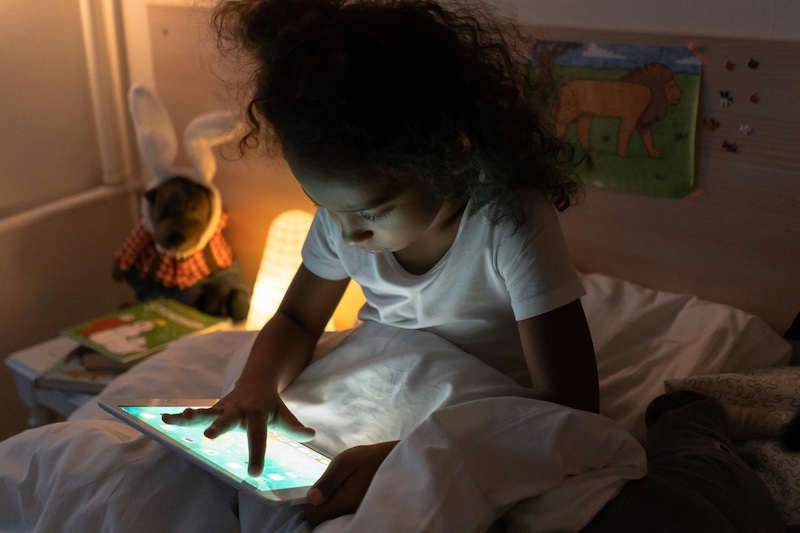As parents, screens are a source of benefit and a source of stress. It feels like there is an endless parade of concerns about some particular study or whether a specific screen-time behavior is okay (FaceTiming Grandma, for example).
I want to take a bigger step back and try to give some more perspective on this whole debate. It’s easy to get in the weeds — What does this one study say? Should I freak out? — and also easy to flip-flop: a week in which screens give you a feeling of sanity by distracting your toddler while you cook dinner, followed by a weekend in which your child is a total jerk about wanting more screen time, and you’re ready to throw the iPad in the trash.
My argument here is we’ll have an easier time navigating this if we can take a broader perspective. Let’s get into the research on screen time and think about how to approach it in your household.
Are screens bad? And why is this question hard?
Why can’t we just have an answer to the question of whether screens are bad or not, and in what way? Is that too much to ask?
Yes. Yes, it is.
To see why this is such a hard problem, let’s think about the ideal experiment, which we could do if we were the dictators of the world and everyone was forced to bend to our will. In this case, we would randomly allocate a large number of babies at birth to different screen exposures. Some would get none, and some would get a limited amount, maybe varying by age; perhaps some would get assigned to many hours a day. In this ideal experiment, our sample size would be very large, we could have many different treatments, and we’d follow everyone for a long time and measure all kinds of outcomes.

The first thing to say is that even this ideal experiment is not actually perfect because technology changes. If we started this experiment in 2004, with the intention of following people through the age of 20, we wouldn’t have known about phones and iPads. The answers we would get about early-life screen exposure might be totally irrelevant to the current system.
Second, this experiment is impossible. Not only would it be prohibitively expensive and difficult to monitor, but almost no one would actually want to enroll, and if they did, we’d be quite worried they wouldn’t follow through on their experimental proposal. We would likely struggle to really believe the results we were getting. The simple fact is that this experiment will never be run.
With the data we have, there are two options for how to learn about this question. The “next best” option to an experiment is some kind of natural experiment — a naturally occurring variation in exposure that results in randomness, even if it is not done explicitly by researchers. The best example of this is a paper co-written by my husband, Jesse Shapiro, that relies on differences in the timing of television introduction to various locations around the U.S. in the 1940s and 1950s. I’ve talked about that paper in most of my books, and I think it’s a great example of this kind of analysis. The paper concludes that television didn’t lower test scores for kids.
However, as good as that paper is, it’s a stretch to apply those conclusions directly to the current moment, just given how different screen exposure is now. And there aren’t a lot of other good examples of this kind of natural variation in the more recent context.
Instead of this, most papers you read on this topic use observational data. That is, researchers have survey data on kids in which they know about their screen exposure, and they measure some or many outcomes. These papers come in many forms. Sometimes, they ask about screen exposure in the past (a retrospective study). Sometimes, they have data about screen exposure, and they follow kids over time (a prospective cohort study). Sometimes, they have a sample of children with some particular issue, and they collect a control group without the issue and compare the screen exposure (a case-control study).
All of these study types share the same basic problem: they can establish correlations between screen exposure and outcomes, but cannot establish causality. There are two significant issues that prevent us from drawing causal conclusions. The first is that the characteristics of families where kids watch a lot of screens differ in other ways — parental education, income, other resources, school quality, etc. — from those who watch less. It is difficult or impossible to separate these other factors (in economics, this issue is called “omitted variable bias”). The second issue is that, in some cases, the outcomes researchers are looking at are driving screen exposure, not the other way around. Parents of kids who have autism or sensory disorders may use screens to regulate behavior, producing a correlation but not suggesting causality (this problem is called “reverse causality”).
Both of these problems are very significant because screen time is an important choice for many families and is wrapped up in all kinds of other features of the family.
In the end, I would argue that we learn almost nothing from papers that use data like this. From a practical standpoint, every time you read a panic headline about screens, look at the data source. If screen exposure isn’t randomized (which it basically never is because — see above — it’s impossible), you shouldn’t read further.
So, how much time on screens is best?
A natural follow-up question to the above is: if none of the panic headlines about screens are real, should I conclude that any amount of screens is fine?
The answer to this is no.
The reason is opportunity cost. In economics, when we think about the cost of anything, we think about both the obvious up-front cost (which we call the “accounting cost”) and also the foregone other uses of the money (the “opportunity cost”). The true economic cost of a banana is the 79 cents I paid for it, plus the happiness I’m giving up by not getting my actual favorite fruit.
This concept is very useful in thinking about the value of time. The “cost” of spending an hour on one activity is, effectively, what else that time would be used for. Here’s me, back in 2013, talking about this idea more broadly. My best personal example of this is from my mother: in my childhood, she once told me that she had our groceries delivered rather than shopping because she had a “high opportunity cost of time.”
In the case of screens, the opportunity cost of screen time is the other stuff your child would be doing. We know kids benefit from being read to, reading, talking to adults, playing outside, and sleeping. To the extent that screens get in the way of that, they do have a cost. That doesn’t mean that they shouldn’t be used! It just says that we should consider what else could be happening.
For me, this influences a huge share of how I think about screen time.
For example, when my kids are on an airplane, screen time is pretty much unlimited. Because what else are they going to be doing? We have more screen time on weekends and vacations (and sick days) because there are fewer other activities to crowd out.
Being explicit about the opportunity-cost idea has also helped us think about changes over time. Generally, my kids have had some television most days before dinner (to give you a sense of the neurotic routine-based life we’ve got over here: raw veggies are served at 5 p.m., and television starts at 5:12. Yes, 5:12; no, I don’t remember why). But my older kid has more to do these days — more homework, more violin practice, more sports — and these dominate. If everything is done, there is screen time. If not, there isn’t. This isn’t seeing screen time as a reward or lack of it as a punishment; it’s simply a reflection of where screens fall in the hierarchy of activities.
A thought experiment that may be helpful here is to remove the emotional valence we associate with screens and imagine that the activity we’re talking about is your kids sitting in their room, staring at the wall. It’s completely neutral. Not especially beneficial, not especially harmful. The question is: when does wall-staring make sense, and when does it not?
Make a plan (and stick to it)
If you do not make a plan about screens, you will fight about them all the time. Your kid loves screens. I’m sorry, but they do. They’re fun and entertaining. YouTube unboxing videos have a pull that I cannot personally explain, but it is real.
A solution to this is a plan for screen time. Decide when it will be allowed — when and for how long — and then hold to that. This will involve some upset. That may happen up front if you want to make a plan that is limited relative to what is happening now. It will certainly involve some unhappiness down the line when you take away the screens. Your child may cry. They may tell you they hate you, and you’re the worst parent.
I am here to tell you: this is okay. You’re not the worst parent. This is just a thing they say! You cannot take it too seriously. If you hold the line, they will get used to things pretty quickly. Just say no!
In your screen time plan, you should also consider the type of content your child will be allowed to watch. Research shows that kids over the age of 2 can learn from television — this can be bad, of course (scary or violent content), but harnessed for good (Sesame Street’s “letter of the day”). Common Sense Media is a great source for information on age appropriateness since it breaks down details rather than just providing a single age rating. So, if you care more about explicit language than scariness, for example, you can evaluate that.
Also related to planning, there is very good evidence that screens within an hour before bed disrupt sleep. If at all possible, this is one time that you should mostly avoid using them. The occasional family movie night? Sure. But ideally, screens before bed would usually be off-limits. (Oh, and that’s true for you, too, adults.)
Closing thoughts
There are no clear and easy answers about screens. Our interactions with them — and our understanding — are going to continue to evolve. Even what we mean by screens will evolve. The iPad has replaced the flat-screen TV, which replaced the set-top box of the 1950s. In another five years, we’ll probably all be sitting on the couch wearing our Apple Vision Pros.
All this change and uncertainty mean we can’t guarantee that we’ll make the right choices for us or our kids. All we can guarantee is that we make thoughtful choices, which is, hopefully, something ParentData helps you do. So, please go forward with an understanding of opportunity cost, a plan for planning, and an avoidance of panic headlines!
The bottom line
- We don’t really know if screens are bad (and if they are, how bad) because the kind of study that would determine this is impossible to do. The studies that we do have can establish correlations between screen exposure and outcomes, but cannot establish causality.
- When thinking about how screen time fits into your family, consider the opportunity cost of that screen time. Is it getting in the way of other beneficial activities they could be doing at that time (sleep, homework, etc.)?
- Make a plan about how screen time will fit into your family. Decide when it will be allowed — when and for how long — and then hold to that.





















Log in
I disagree that a kid spending time staring at a wall is entirely neutral. There’s a lot of research about how the Default Mode Network gets activated when our conscious mind is disengaged, and how that is very important for creativity, executive functioning, consolidating memory and learning, and other things. Treating such time as perfectly neutral could justify eliminating it, which would be detrimental.